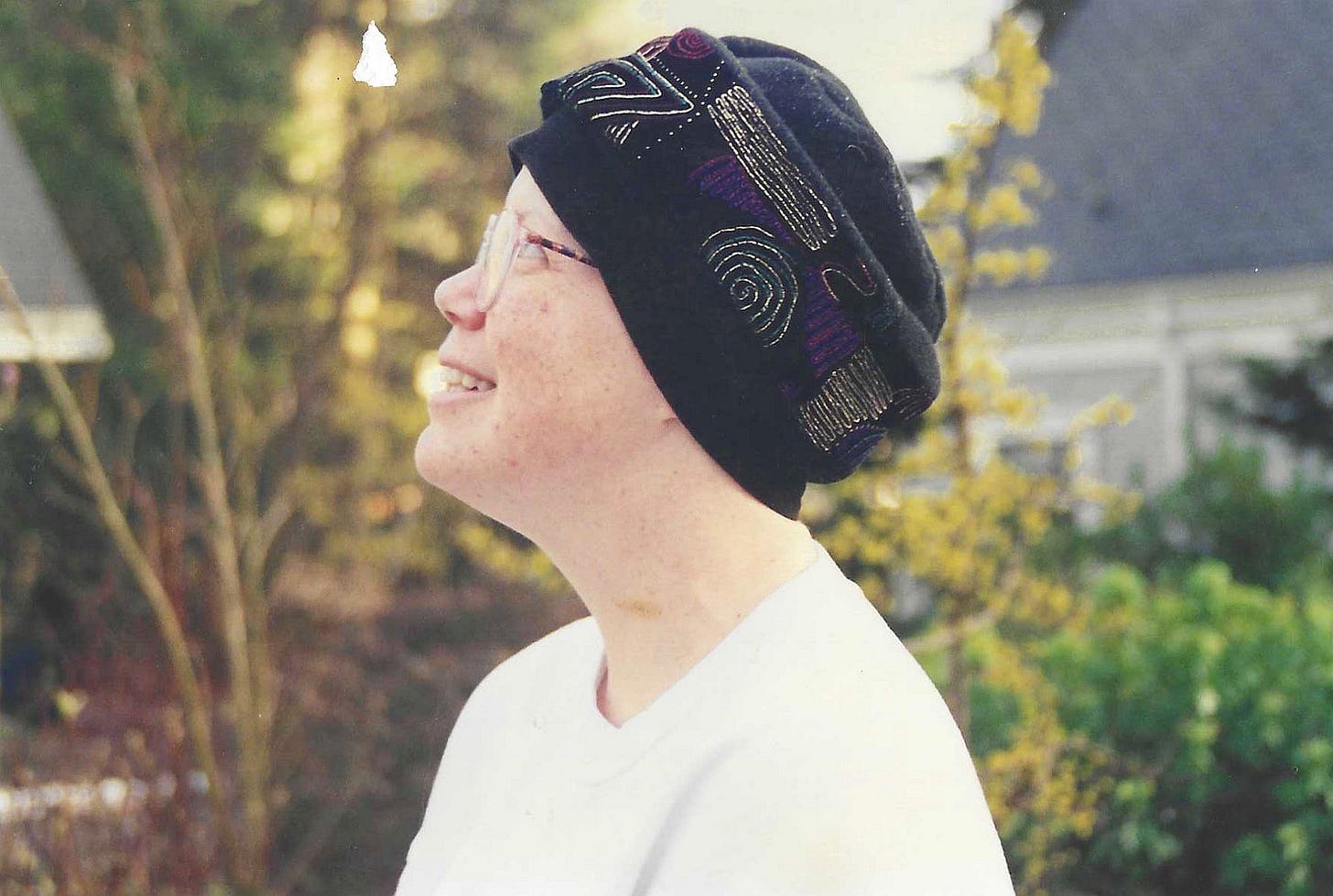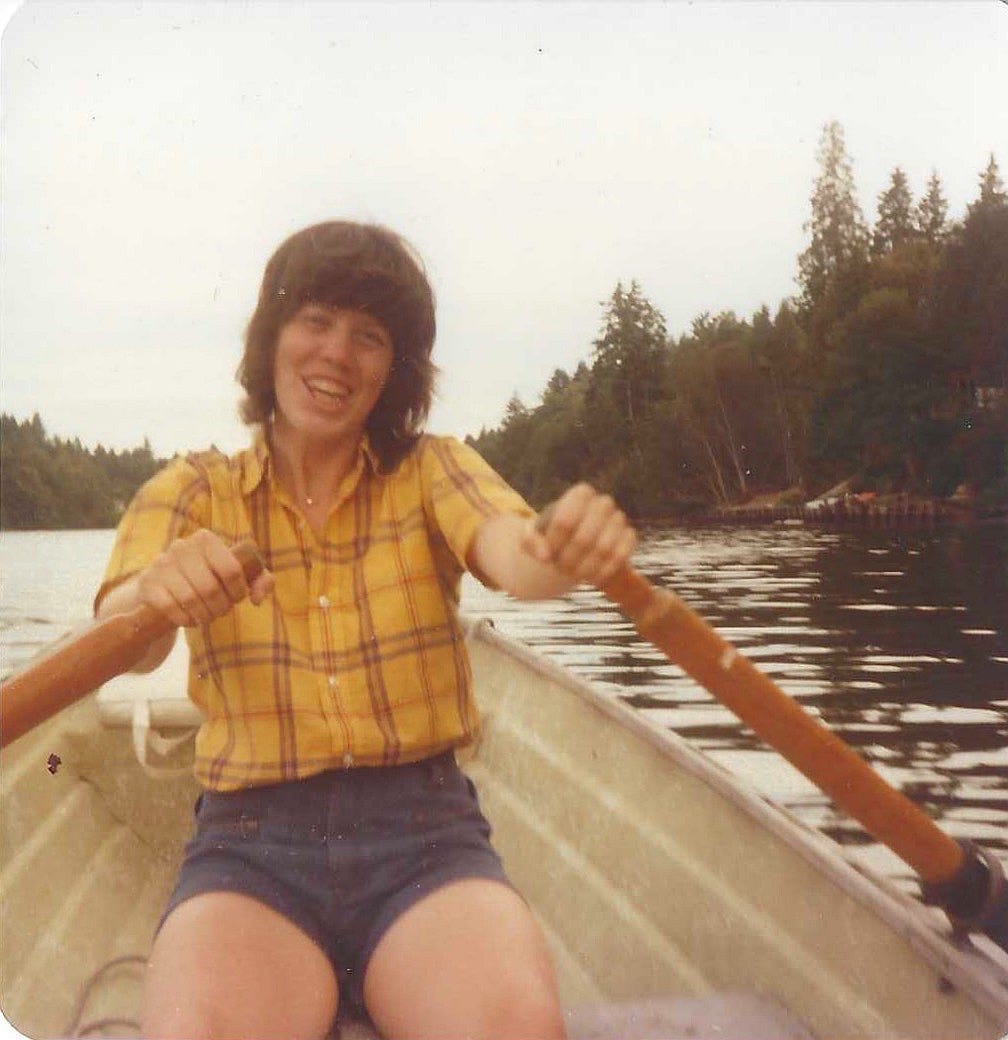twenty-five years
the symphony of grief
When I was younger I would get incredibly sick every year at this time. Before my mind could remember it was approaching, my body did.
Today is the 25-year-anniversary of my mother’s death.
This year, my body has been remembering through rich, full, and just-beneath-the-surface tenderness.
The story of a one-winged bumblebee rescued by humans who tended her for the remaining weeks of her life in stark contrast to the ongoing, unnecessary wars unfolding on the global stage.
In this quarter century journey with grief, I’m still learning about it and from it.
How shocking it is to look at pictures of my mom and she is so full of life that it can feel as if I could just look at the photo long enough and fiercely enough she might all of a sudden say something to me. Or I might hear her laugh skip across time. She might just be alive again. For an instant or a day.
This odd sensation - that if long for her hard enough I could will her to return for just a short time - has become louder as I’ve gotten older, which somehow makes no sense at all because I’m all grown up and no longer have a child’s all-powerful ability to make believe. And yet, here I am feeling just short of wanting it enough to make it real.
Grief made me grow up much too early and as with all things, this has been a benefit and a burden. I have been able to be a steady source of support for people I love and who rely on me. I also never fully believe that other people will stick around, even if they really want to.
Grief has made me more compassionate, forgiving, and curious. Challenging me to ask what else might be going on for someone who is driving angrily, or being rude, or avoiding me. Paradoxically, I have resented others for not experiencing as much lossas I have, while also never truly wishing it on anyone. Not really.
Grief has made me feel perpetually misunderstood and uniquely alone no matter how many close friends, good partners, and loving family I have around me. It also drove me to develop incredible social agility and relational skills that have enabled me to make enduring, authentic, deeply intimate friendships and connections.
Grief has instilled in me an intimate connection to my own mortality. In an odd way it’s a struggle to imagine myself every growing old and I’ve spent a lot of time contemplating my own death. When I write in my journal, the intended readers are grown children who have survived my loss. I try to share an authentic and accurately imperfect version of myself, while also trying to teach them the lessons I am in the midst of learning.
Grief makes other people uncomfortable. So does death. At least in the cultures I grew up in. Most people avoid addressing it and as a child I decided early on not to share mine with others because it was so clear how uncomfortable it made the adults around me.
But here’s the thing.
Grief is also magnificent. It is an intense symphony of love and pain trying to fill the space someone or something beautiful once occupied. It demands that we hold complex and competing truths. It begs to be seen, acknowledged, felt, and tended to. It entreats us to do something worthwhile - something kind - with our precious, short time on this breathtaking planet.
If you let yourself experience your grief, you will become more human and more spirit.
If you do not, you will lose both.
You cannot harden in the arms of Grief.
In Memory of Ann Tyler Chadwick
First-born daughter, big sister, passionate nurse, loving wife, devoted mother, and adoring friend.
August 24, 1955 - April 11, 1999
How to Support Someone Who is Grieving:
Don’t tell someone who has lost or is losing someone that “everything happens for a reason” or “they are in a better place” or any other unoriginal platitudes that are trying to makes the situation better than it is.
There is nothing you - or anyone else - can say that will make it better. Nothing. And when you try, it pours salt into a bottomless, unhealable wound.
You can’t do is comfort away grief. And you shouldn’t try.
Grief belongs here. It needs to be here.
What you can do is acknowledge how heartbreaking and painful it is.
You can communicate that you care.
You can communicate that you are able and willing to be of support, however that looks for the person grieving.
Maybe it’s cleaning their house for them and pickign up groceries. Maybe it’s running interference with other meddlesome family and friends. Maybe it’s taking them out to distract them or to get roaring drunk. Maybe it’s going on a walk and saying nothing at all. Maybe it is giving them space.
We truly all grieve differently and it changes from moment to moment, and day to day.
Invitation:
In the new year, there has been a small uptick in subscriptions ending. I fully support people to do what is best for their budgets, households, and peace of mind.
That said, I devote meaningful time each month to working on these pieces, and I would love to continue to invest in and create them as well as be able to keep man of them available for free. In order to do that I need to sustain a certain amount of paid subscribers each month. If you’ve ever wanted to support this work and you currently have the capacity, now would be a really impactful time to become a patron of this newsletter!
Free subscriptions will forever include one essay a month, as long as this publication is sustainable to provide.
Paid subscribers will get at least one additional essay each month. If you’d like to support this writing to continue and/or be in on the action you can upgrade to the $7/mo paid subscription here:
Additionally, I will experimenting with some new, different formats - some shorter, maybe a podcast, maybe short little recommendations lists…
Either way, thank you for being part of the journey.
Little Things & Extra Goods:
Grief and Praise: I can’t remember if I shared this talk given by Martín Prechtel but even if I have, it is worth re-sharing many times over. I come back to it every few years and it calls to that mystical, inalienable part of us that both connects with and is made of something eternal.
With love,




